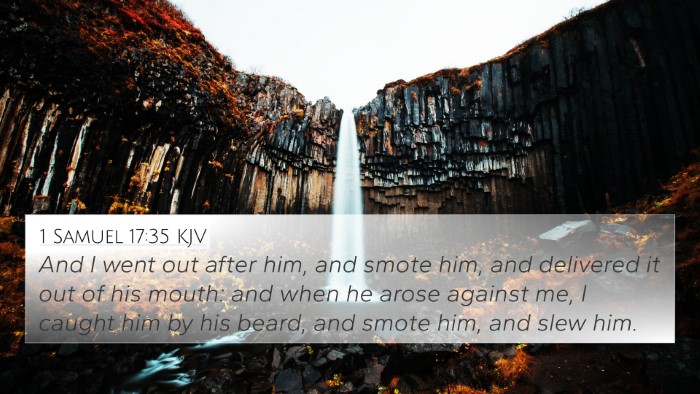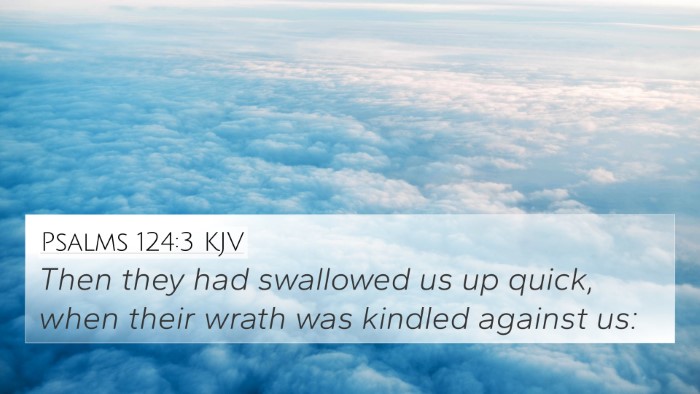Old Testament
Genesis Exodus Leviticus Numbers Deuteronomy Joshua Judges Ruth 1 Samuel 2 Samuel 1 Kings 2 Kings 1 Chronicles 2 Chronicles Ezra Nehemiah Esther Job Psalms Proverbs Ecclesiastes Song of Solomon Isaiah Jeremiah Lamentations Ezekiel Daniel Hosea Joel Amos Obadiah Jonah Micah Nahum Habakkuk Zephaniah Haggai Zechariah MalachiJob 29:17 Similar Verses
Job 29:17 Cross References
And I brake the jaws of the wicked, and plucked the spoil out of his teeth.
Uncover the Rich Themes and Topics of This Bible Verse
Listed below are the Bible themes associated with Job 29:17. We invite you to explore each theme to gain deeper insights into the Scriptures.
Job 29:17 Cross Reference Verses
This section features a detailed cross-reference designed to enrich your understanding of the Scriptures. Below, you will find carefully selected verses that echo the themes and teachings related to Job 29:17 KJV. Click on any image to explore detailed analyses of related Bible verses and uncover deeper theological insights.

Psalms 3:7 (KJV) »
Arise, O LORD; save me, O my God: for thou hast smitten all mine enemies upon the cheek bone; thou hast broken the teeth of the ungodly.

Proverbs 30:14 (KJV) »
There is a generation, whose teeth are as swords, and their jaw teeth as knives, to devour the poor from off the earth, and the needy from among men.

1 Samuel 17:35 (KJV) »
And I went out after him, and smote him, and delivered it out of his mouth: and when he arose against me, I caught him by his beard, and smote him, and slew him.

Psalms 58:8 (KJV) »
As a snail which melteth, let every one of them pass away: like the untimely birth of a woman, that they may not see the sun.
Job 29:17 Verse Analysis and Similar Verses
Understanding Job 29:17
Job 29:17 states, "And I broke the jaws of the wicked, and plucked the prey out of his teeth." This verse reveals Job's reflection on his past righteousness and justice.
Meaning and Insights
This verse is part of a larger discourse where Job recounts his former state of honor and the justice he administered. The following insights are gathered from various public domain commentaries:
Matthew Henry's Commentary
According to Matthew Henry, this verse signifies Job's assertive stand against injustice and his active role in protecting the vulnerable. Job portrays a strong image of a defender, showcasing his commitment to righteousness. Henry notes that breaking the jaws of the wicked indicates a profound defeat of oppression and evil, reflecting Job's earlier life when he exhibited both strength and compassion.
Albert Barnes' Commentary
Albert Barnes explains that the metaphor of ‘breaking the jaws of the wicked’ illustrates the severity of Job's actions against those who acted unjustly. Barnes implies that Job is reminiscing about his authority and capability to combat evil, suggesting that he once held respect and positioned himself as a champion for the afflicted.
Adam Clarke's Commentary
Adam Clarke further elaborates that this statement serves as a reflection of Job’s dignity in the community and his role as a protector. Clarke emphasizes the language of warfare used in this verse, suggesting that Job's strong action against wrongdoing demonstrates both his vigor and the moral high ground he occupied prior to his afflictions.
Key Themes
The verse encapsulates several critical themes:
- Justice and Righteousness: Job's assertion highlights his commitment to justice.
- Defense of the Vulnerable: The action of plucking prey from teeth is a strong metaphor for protection.
- Contrast to Current Suffering: Job’s recollection contrasts sharply with his present state of despair.
Bible Cross-References
Job 29:17 connects to several other verses that deepen its understanding:
- Proverbs 31:8-9: Encourages speaking up for those who cannot speak for themselves.
- Psalms 82:3-4: Calls for the defense of the poor and needy, emphasizing justice.
- Psalms 10:17-18: Highlights God's concern for the oppressed and justice.
- Psalms 41:1: Blessed is he who considers the poor, reflecting Job's actions.
- Isaiah 1:17: Urges to learn to do good, seek justice, and correct oppression.
- Jeremiah 22:3: Emphasizes the importance of doing justice and righteousness.
- James 1:27: Discusses pure religion as caring for the orphan and widows, akin to Job's actions.
Connecting Themes Across Scripture
Job 29:17 is a crucial example in understanding the interconnectedness of Biblical themes. The themes of justice, compassion, and moral integrity transcend both the Old and the New Testaments. Through cross-referencing, readers can experience a richer understanding of Biblical morality.
Thematic Bible Verse Connections
Examining Job’s memories allows us to draw thematic connections across many scriptures:
- Defending the oppressed is a continuous motif from Job through the Prophets to the teachings of Christ.
- Job's proactive stance against evil is mirrored in the New Testament, particularly in the Gospel accounts where Jesus confronts injustice.
Practical Applications
This verse illuminates how one might identify and counteract injustice in contemporary life. The faithful are urged to:
- Actively defend others: Following Job's example, believers are called to uplift those in distress.
- Maintain integrity: Adhering to principles of justice as Job did, even in personal suffering.
- Engage with scripture: Use tools such as a Bible concordance for understanding the links between verses.
Conclusion
Job 29:17 is not only a recollection of Job's past but also a powerful statement about the Christian call to justice and protection for the vulnerable. Through the exploration of cross-references and thematic connections, believers can build a comprehensive understanding of the Biblical call to righteousness and the profound significance of defending the oppressed.




